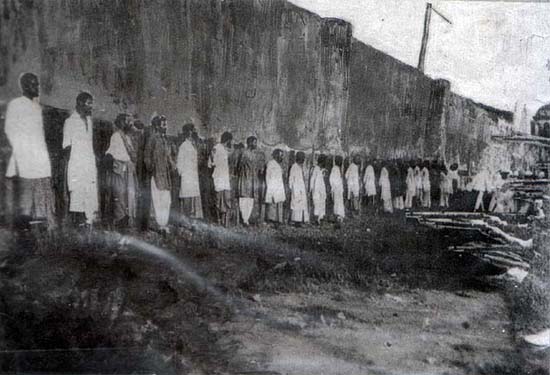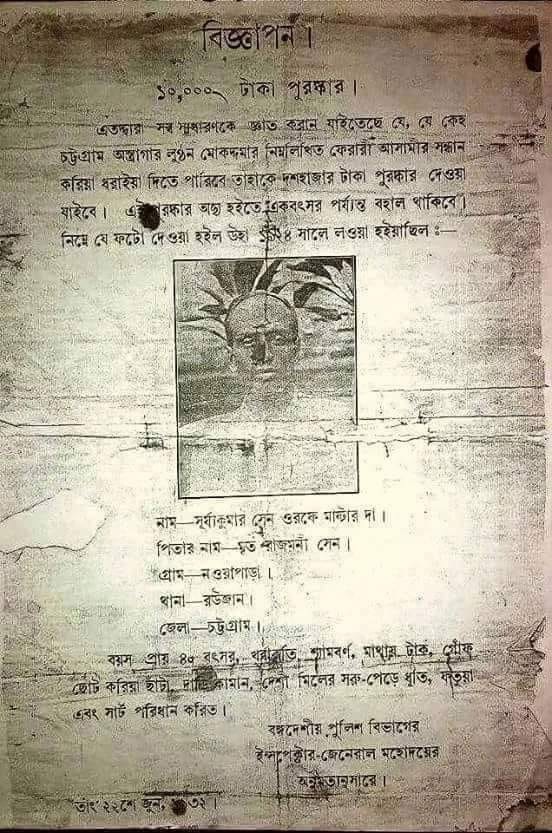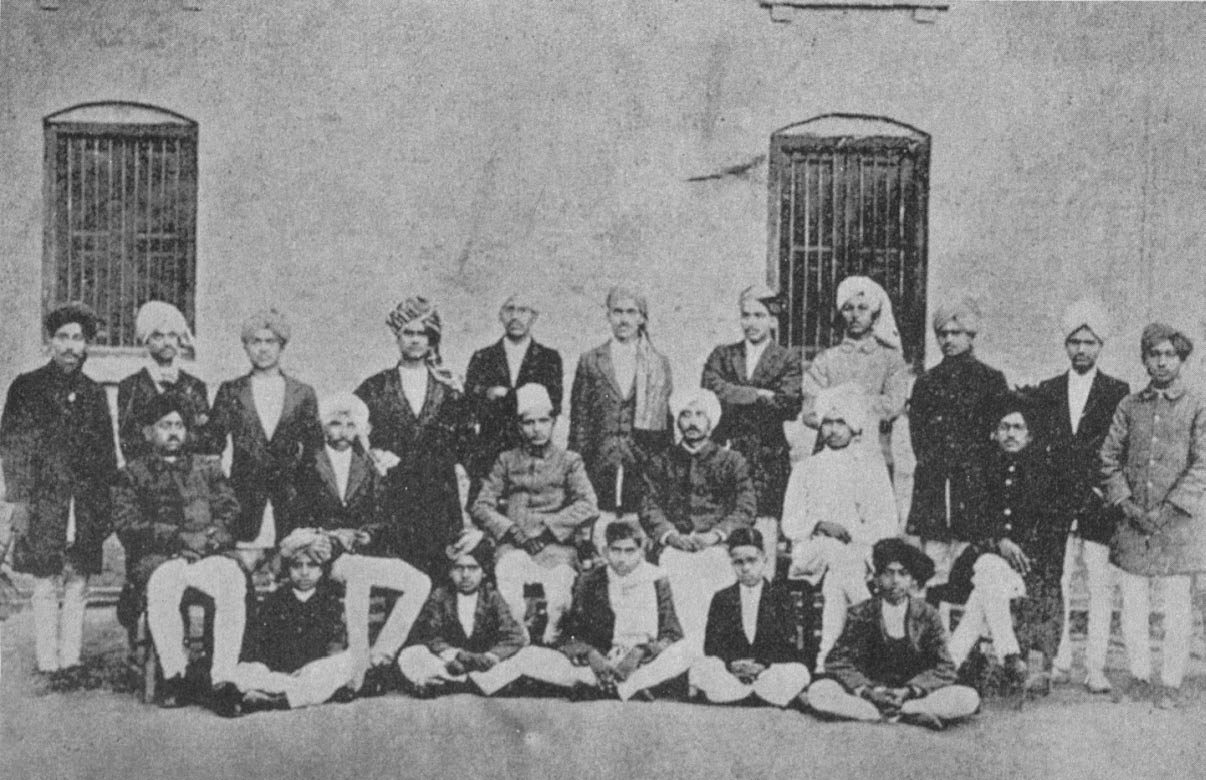|
Chittagong Armoury Raid
The Chittagong Uprising termed by the British as Chittagong Armoury Raid, was an attempt on 18 April 1930 to raid the armoury of police and auxiliary forces from the Chittagong armoury of Bengal Province in British India (now in Bangladesh) by armed Indian independence fighters led by Surya Sen, Nirmal Sen, Ambika Chakrobarty, Ananta Singh, Ganesh Ghosh, Lokenath Bal. Background : Early activities The revolutionary history of Chittagong includes significant events such as the Chittagong Armoury Raid, the Battle of Jalalabad Hills, the Dhalghat encounter, and the Pahartali Ward Club attack. Among these, the armoury raid on 18 April 1930, is one of the most notable episodes. Understanding the revolutionary activities and political climate in Chittagong prior to this event is essential to comprehending its significance. The revolutionary group in Chittagong was led by Surya Sen, popularly known as Masterda, a resident of Raozan Upazila. After earning a Bachelor of Arts ... [...More Info...] [...Related Items...] OR: [Wikipedia] [Google] [Baidu] |
Revolutionary Movement For Indian Independence
The Revolutionary movement for Indian Independence was part of the Indian independence movement comprising the actions of violent underground revolutionary factions. Groups believing in armed revolution against the ruling British fall into this category, as opposed to the generally peaceful civil disobedience movement spearheaded by Mahatma Gandhi. The revolutionary groups were mainly concentrated in Bengal Presidency, Bengal, Bombay Presidency, Bombay, Bihar Province, Bihar, the United Provinces of Agra and Oudh, United Provinces and Punjab Province (British India), Punjab. More groups were scattered across British Raj, India. Beginnings Apart from a few stray incidents, the armed rebellion against the British rulers was not organized before the beginning of the 20th century. The revolutionary philosophies and movement made their presence felt during the 1905 Partition of Bengal (1905), partition of Bengal. Arguably, the initial steps to organise the revolutionaries were take ... [...More Info...] [...Related Items...] OR: [Wikipedia] [Google] [Baidu] |
Surjo Sen
Surya Sen, also known as Surya Kumar Sen (22 March 189412 January 1934), was an Indian revolutionary and played a significant role in the Indian independence movement against British rule. He is best known for leading the Chittagong Armoury Raid in 1930. Sen was a school teacher by profession and was popularly known as ''Master Da'' ("da" is an honorific suffix derived from "dada", meaning elder brother in Bengali language). He was influenced by the nationalist ideals in 1916 while he was a student of B.A. in Berhampore College (Now MES College). In 1918, he was selected as president of the Indian National Congress's Chittagong branch. Sen was known for recruiting a group of young and passionate revolutionaries known as the Chittagong group. The group included Ananta Singh, Ganesh Ghosh and Lokenath Bal, and fought against the British stationed in Chittagong. He was an active participant in the Non-co-operation movement and was later arrested and imprisoned for two years fro ... [...More Info...] [...Related Items...] OR: [Wikipedia] [Google] [Baidu] |
Rajat Sen
Rajat Sen (1913 ― 6 May 1930) alias Rajat Kumar Sen was a Bengali revolutionary who joined in the Chittagong armoury raid. He died in a Kalarpole encounter with the Indian Imperial Police. Revolutionary activities Rajat Sen was born in British India in 1913. He hailed from Feringibazar, Chittagong, his father's name was Ranjan Lal Sen. Sen joined in revolutionary politics against the British rule while studying in intermediate class. He took active participation in the Chittagong Uprising led by ''Masterda'' Surya Sen Surya Sen, also known as Surya Kumar Sen (22 March 189412 January 1934), was an Indian revolutionary and played a significant role in the Indian independence movement against British rule. He is best known for leading the Chittagong Armoury .... Being a member of Masterda's Indian Republican Army he took part in the Armoury raid on 18 April 1930 and an armed encounter in Jalalabad hill on 22 April 1930. After the encounter Sen along with his comrades reti ... [...More Info...] [...Related Items...] OR: [Wikipedia] [Google] [Baidu] |
Bhagat Singh
Bhagat Singh (27 September 1907 – 23 March 1931) was an Indian anti-colonial revolutionary who participated in the mistaken murder of a junior British police officer in December 1928 in what was intended to be retaliation for the death of an Indian nationalist. * * * * He later took part in a largely symbolic bombing of the Central Legislative Assembly in Delhi and a hunger strike in jail, which—on the back of sympathetic coverage in Indian-owned newspapers—turned him into a household name in the Punjab region, and, after his execution at age 23, a martyr and folk hero in Northern India. * * * Borrowing ideas from Bolshevism and anarchism, * * * * * * * the charismatic Bhagat Singh electrified a growing militancy in India in the 1930s and prompted urgent introspection within the Indian National Congress's nonviolent, but eventually successful, campaign for India's independence. * * * * In December 1928, Bhagat Singh and an associate, Shivaram Rajgu ... [...More Info...] [...Related Items...] OR: [Wikipedia] [Google] [Baidu] |
Jatin Das
Jatindra Nath Das (; 27 October 1904 – 13 September 1929), better known as Jatin Das, was an Indian independence activist and revolutionary who worked to make India independent from the British Raj and was a member of the Hindustan Socialist Republican Association. He died in the Lahore Central Jail after a 63-day hunger strike. Early life Das was born in 1904 at Calcutta. He passed the matriculation and intermediate examinations in the First Division. He joined the Anushilan Samiti, a revolutionary group in Bengal, and also participated in Mahatma Gandhi's non-cooperation movement in 1921, aged 17. In November 1925, while studying for a B.A. at Bangabasi College in Calcutta, Das was arrested for his political activities and was imprisoned at the jail in Mymensingh. While interned there, he went on a hunger strike to protest the ill-treatment meted out to the political prisoners. After fasting for twenty days, the jail's superintendent apologised and he gave up the fast. ... [...More Info...] [...Related Items...] OR: [Wikipedia] [Google] [Baidu] |
Subhas Chandra Bose
Subhas Chandra Bose (23 January 1897 – 18 August 1945) was an Indian independence movement, Indian nationalist whose defiance of British raj, British authority in India made him a hero among many Indians, but his wartime alliances with Nazi Germany and Japanese Fascism, Fascist Japan left a legacy vexed by authoritarianism, anti-Semitism, and military incompetence, military failure. * The honorific 'Netaji' (Hindustani language, Hindustani: "Respected Leader") was first applied to Bose in Germany in early 1942—by the Indian soldiers of the ''Indian Legion, Indische Legion'' and by the German and Indian officials in the Special Bureau for India in Berlin. It is now used throughout India. Bose was born into wealth and privilege in a large Bengalis, Bengali family in Orissa during the British Raj. The early recipient of an Anglocentrism, Anglo-centric education, he was sent after college to England to take the Indian Civil Service examination. He succeeded with distincti ... [...More Info...] [...Related Items...] OR: [Wikipedia] [Google] [Baidu] |
Premananda Dutta
Premananda Dutta was a Bengali revolutionary and activist of Indian freedom struggle attached with Chittagong Rebellion against the British Government in India. Early life Dutta was born in Chittagong (Chattagram) in British India presently in Bangladesh. His father Harish Chandra Dutta was an ''Acharya'' of Brahmo Samaj. After passing from Chittagong College he joined in the post of Port Preventive Officer in Port of Chittagong. In the call of ''Deshbandhu'' Chittaranjan Das he left the job and took part in Non-cooperation movement subsequently became imprisoned for this. Dutta also took active part in the strike of Assam Bengal Railway in support of the movement of tea garden labours against British atrocities. For such nationalist political activities he went to the jail several times. In 1923, Dutta along with some youth fellows made a gymnasium and club in Chittagong town which was actually the secret den of freedom fighters. Revolutionary activities In 1930 he attracte ... [...More Info...] [...Related Items...] OR: [Wikipedia] [Google] [Baidu] |
Jatindra Mohan Sengupta
Jatindra Mohan Sengupta (22 February 1885 – 23 July 1933) was an Indian revolutionary against the British rule. He was arrested several times by the British police. In 1933, he died in a prison located in Ranchi, India. Sengupta studied at Hare School, Calcutta and Presidency College, Calcutta. After that he travelled to England, where he studied law at Downing College, Cambridge. During his stay there, he met and married Edith Ellen Gray, later known as Nellie Sengupta. He was elected president of the Cambridge Majlis in 1908. After returning to India, he started a legal practice. He also joined in Indian politics, becoming a member of the Indian National Congress and participating in the Non-Cooperation Movement. Eventually, he gave up his legal practice in favour of his political commitment. Early life Jatindra Mohan Sengupta was born on 22 February 1885 to a prominent land-owning ('' zamindar'') family of Barama, in Chittagong district of British India (now in C ... [...More Info...] [...Related Items...] OR: [Wikipedia] [Google] [Baidu] |
Deben Dey
Deben may refer to: * Deben (unit), a weight unit used in ancient Egypt * River Deben, a river in Suffolk, England * John Gummer, Baron Deben * Deben, a variant spelling of Dibeng Dibeng is a town in John Taolo Gaetsewe District Municipality in the Northern Cape province of South Africa, situated on the banks of the dry Gamagara River. The name is Tswana Tswana may refer to: * Tswana people, the Bantu languages, Bantu sp ..., Northern Cape, South Africa See also * Debden (other) {{Disambig, geo ... [...More Info...] [...Related Items...] OR: [Wikipedia] [Google] [Baidu] |
Masterda Surya Sen
Surya Sen, also known as Surya Kumar Sen (22 March 189412 January 1934), was an Indian revolutionary and played a significant role in the Indian independence movement against British rule. He is best known for leading the Chittagong Armoury Raid in 1930. Sen was a school teacher by profession and was popularly known as ''Master Da'' ("da" is an honorific suffix derived from "dada", meaning elder brother in Bengali language). He was influenced by the nationalist ideals in 1916 while he was a student of B.A. in Berhampore College (Now MES College). In 1918, he was selected as president of the Indian National Congress's Chittagong branch. Sen was known for recruiting a group of young and passionate revolutionaries known as the Chittagong group. The group included Ananta Singh, Ganesh Ghosh and Lokenath Bal, and fought against the British stationed in Chittagong. He was an active participant in the Non-co-operation movement and was later arrested and imprisoned for two years fro ... [...More Info...] [...Related Items...] OR: [Wikipedia] [Google] [Baidu] |
Kalpana Datta
Kalpana Datta (27 July 1913 – 8 February 1995), also Kalpana Joshi, was an Indian independence movement activist and a member of the armed independence movement led by Surya Sen, which carried out the Chittagong armoury raid in 1930. Later she joined the Communist Party of India and married Puran Chand Joshi, the general secretary of the party in 1943. Early life Kalpana Datta (also commonly spelled Dutta) was born at Sripur, a village of Chittagong District in the Bengal Province of British India (Sripur is now located in Boalkhali Upazila in Bangladesh). Her father Binod Behari Dattagupta was a government employee. After passing her matriculation examination in 1929 in Chittagong, she went to Calcutta and joined the Bethune College to study science. Soon, she joined the '' Chhatri Sangha'' (Women Students Association), a semi-revolutionary organization in which Bina Das and Pritilata Waddedar were also active members. Armed independence movement The Chittagong armoury r ... [...More Info...] [...Related Items...] OR: [Wikipedia] [Google] [Baidu] |
Pritilata Waddedar
Pritilata Waddedar (5 May 1911 – 24 September 1932) was a Bengalis, Bengali Revolutionary nationalism, revolutionary nationalist who was influential in the Indian independence movement, independence movement. After completing her education in Chittagong, Chattogram (formerly Chittagong) and Dhaka (formerly Dacca), she attended Bethune College in Kolkata (formerly Calcutta). She graduated in philosophy with distinction and became a school teacher. She is praised as "Bengal's first woman martyr". Pritilata joined a revolutionary group headed by Surya Sen. She is known for leading fifteen revolutionaries in the 1932 armed attack on the Pahartali European Club, during which one person was killed and eleven injured. The revolutionaries torched the club and were later caught by the Indian Imperial Police, colonial police. Pritilata committed suicide by Cyanide poisoning, cyanide. Her suicide was preplanned. She had a suicide note or a letter with her, where she had penned down the o ... [...More Info...] [...Related Items...] OR: [Wikipedia] [Google] [Baidu] |








